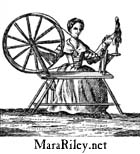| "Everything back then was handmade and therefore primitive." | |
|
A visit to Mt. Vernon, Monticello, Williamsburg, or any antiques show with fine 18th century cabinetry made in Philadelphia, Boston or other centers of population ought to dispell the "handmade = primitive" idea. Craftsmen studied for years to master their crafts; even a cursory glance at objects made from the middle ages through the late Renaissance would dispell this myth. I've seen so-called craftsmen selling ironwork, woodwork, and other items at period crafts festivals that an apprentice would have been ashamed to acknowledge. Nonetheless, there is a grain of truth to the argument -- some objects were made at home because an item was either too expensive or unavailable. During certain periods of American colonial history, craftsmen in the colonies were prohibited from manufacturing and selling specific objects because England wanted the colonies to provide England with raw materials and serve as a market for England's manufactured goods (often at a higher price, due to the cost of transporting items that the colonists might otherwise have been able to make for themselves more cheaply). Many colonists also thought that they were not receiving full value for their raw materials; some also wound up deeply in debt to English creditors from whom they had to purchase necessary objects. This system was one of the contributing factors of the American Revolution. A look at the inventories of stores and ships coming into American ports prior to the revolution will show that there was an awful lot of stuff being imported -- so fine fabric, and items from cabinets to carriages, would have been readily available. Even on the frontier, merchants carried such imported items as china cups and silk caps. (For more on that, see my rant about people on the frontier.)
|
|
|
|
|
|
|
|
